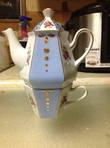Terri Lynn Main's Blog, page 6
July 2, 2013
Some of my favorite Books on Kindle Publishing
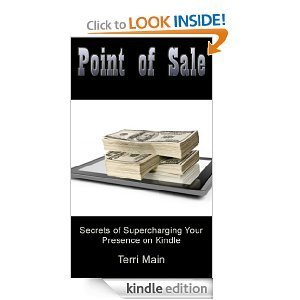 I was on an email discussion list today and someone asked about books on Kindle Publishing. An hour later, I had written out an annotated bibliography of some of my favorites. So, I'm going to reprint that here. BTW, don't forget my own book about doing well in the Amazon Search engine Called Point of Sale.
I was on an email discussion list today and someone asked about books on Kindle Publishing. An hour later, I had written out an annotated bibliography of some of my favorites. So, I'm going to reprint that here. BTW, don't forget my own book about doing well in the Amazon Search engine Called Point of Sale. I read several books before starting to self publish. I found good ideas (and some very bad ones) in each. Like my Mother used to say, "You take the chicken and you leave the bones alone." Also, you will find each of these writers, people who were quite successful individually, will disagree about several issues.
So, with those disclaimers here are my collection:
John Locke: How I sold a million ebooks in five months.
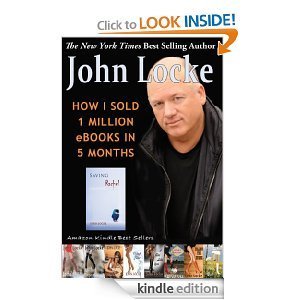
A bit misleading title since he had a few years preparing the book, but the idea is still good. If you can stomach Locke's arrogance, pomposity and sense of self-importance, you can find some very useful information here. Some ideas, like his "Blog posts that will change your life" and his use of Twitter to build email contacts, I think will work only for people with a certain personality type. Also, remember, Locke got dinged for using "sock puppets" to post fake good reviews of his own books. But having said all that, there are some excellent pointers here. He was the one who convinced me to stick to my 99 cent price point. I loved his reasoning. His idea was that of being competitive. Someone could buy 10 of his books for the price of one James Patterson novel. He said something like: Is Patterson 10 times the writer I am?
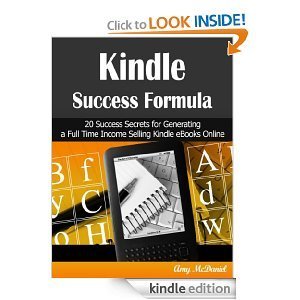 Amy McDaniel Kindle Success Formula
Amy McDaniel Kindle Success FormulaMcDaniel is probably my favorite writer on Kindle publishing. Her books are clear, easy to read, and take a step by step approach. Having said that, I think sometimes she over charges. She sells her books at various prices, but sticks close to the $2.99 price point which bothers me a bit when some of her books are under 100 pages. However, having said that, this is a good basic primer for the person wanting to get started. It is a bit dated because some things have changed with Kindle since its publication, but overall, it is a good solid book.
Amy McDaniel Kindle Formatting Formula
Everything I learned to format my first kindle upload came from this and the next book I'll mention. It's simple, easy to follow and once you get this process down,
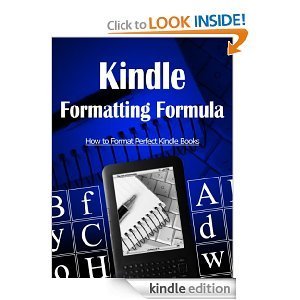 you can do the whole thing in 30 minutes or less. The book however, is dated. You no longer have to convert your file to a .mobi format. Kindle will do the conversion for you. However, if you have InDesign, there is a plugin you can download from Kindle that will do the conversion so you can both download and preview before uploading to Kindle. But that's for design geeks and others who want to do a bit more. I did that for awhile, but then I started just uploading my MS-Word files and couldn't tell the difference in the output. Therefore, I just decided to cut out that step.
you can do the whole thing in 30 minutes or less. The book however, is dated. You no longer have to convert your file to a .mobi format. Kindle will do the conversion for you. However, if you have InDesign, there is a plugin you can download from Kindle that will do the conversion so you can both download and preview before uploading to Kindle. But that's for design geeks and others who want to do a bit more. I did that for awhile, but then I started just uploading my MS-Word files and couldn't tell the difference in the output. Therefore, I just decided to cut out that step. Publish on Kindle With Kindle Direct Publishing by Amazon http://www.amazon.com/Publish-
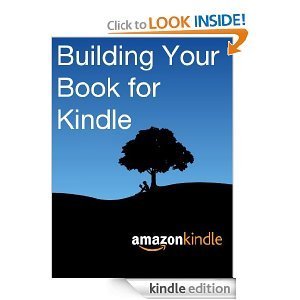 Amazon-Kindle-Publishing-ebook/dp/B004LX069M/Simplified Kindle Formatting Guide https://kdp.amazon.com/self-publishing/help?topicId=A17W8UM0MMSQX6Building Your Book on Kindle http://www.amazon.com/dp/B007URVZJ6
Amazon-Kindle-Publishing-ebook/dp/B004LX069M/Simplified Kindle Formatting Guide https://kdp.amazon.com/self-publishing/help?topicId=A17W8UM0MMSQX6Building Your Book on Kindle http://www.amazon.com/dp/B007URVZJ6One really good thing about all of these is that they are free. The other good thing is they are from the source. The Simplified Formatting Guide is technically not a book, but a webpage. Kindle's help section is wonderful. Anything you want to know about formatting, uploading, account information, requirements, etc. you can find simply by going to your Kindle Direct Dashboard and clicking on the help button. There is a great section just on formatting your document. It is the most up-to-date information. I noticed, when preparing this, that they are suggesting now to convert .doc to html files. No biggie since it can be done inside of any word processor, but it is good to know. However, I've not had any trouble with my .doc files, except for one which was my fault entirely.
BTW, the most useful and recent content I found is in the Building Your Book on Kindle. It shows everything based on the most recent version of MS-Word 2013. (No big changes between 2013 and 2007 but it shows how recent this book is.)
Kate Harper, How to Create an Ebook Cover for Non-Designers
One of the things I emphasize with new ebook writer/publishers is that you don't have to spend a fortune on "experts" to help you do everything. Most people have on their computers or available by download (free download) or in the cloud
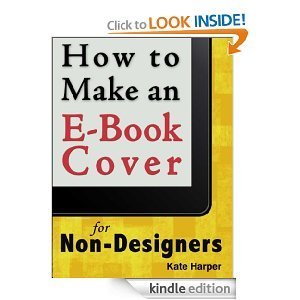 everything they need to create a good quality book cover. That's why I like Harper's book. She shows you step-by-step how to do it using MS-Word or Photoshop. Some of the book is a bit dated, but the basics of design are still strong. BTW, if you don't have Photoshop, you can download GIMP (http://www.gimp.org ) which is as good as photoshop for this sort of thing and is free. Also, I've designed covers using http://www.pixlr.com advanced editor. Both of these free options have the same look and feel of photoshop. If you learn the photoshop technique she teaches, you can probably use one of these programs to do the same thing.
everything they need to create a good quality book cover. That's why I like Harper's book. She shows you step-by-step how to do it using MS-Word or Photoshop. Some of the book is a bit dated, but the basics of design are still strong. BTW, if you don't have Photoshop, you can download GIMP (http://www.gimp.org ) which is as good as photoshop for this sort of thing and is free. Also, I've designed covers using http://www.pixlr.com advanced editor. Both of these free options have the same look and feel of photoshop. If you learn the photoshop technique she teaches, you can probably use one of these programs to do the same thing.Incidentally, Amazon has upgraded their Kindle cover creator which simplifies the process greatly. My last book, I used it and had a cover done in about five minutes that looks great. I don't know I'll use it for all my covers, but it was better than I expected.
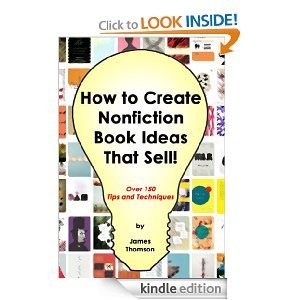 James Thompson How to Create Nonfiction Book Ideas that Sell
James Thompson How to Create Nonfiction Book Ideas that SellWhile not specific to ebooks, this was a great book about coming up with ideas and market testing them using tools you find on Amazon. I really found this useful. And now that I'm clearing out the last of my private clients and going into writing books full time, I'm sure I'll be using these techniques a lot. Not fiction oriented, but most writers, I believe, should diversify if they want to stay fiscally solvent.
Michael Alvear How to Make a Killing on Kindle without Blogging, Facebook and Twitter
Okay, like Locke, Alvear is a bit full of himself, and his language is less than
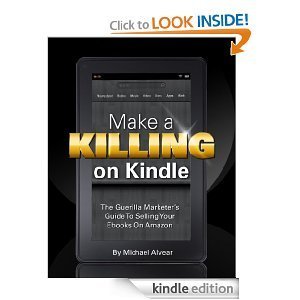 pristine. And as a social media person, I say he is probably right about blogging, but Facebook and Twitter are the town square or general store of the new millenium where people meet. However, I do think you can probably do away with them all and still do a good job selling on Kindle because of the conversion factor. If you are depending on your social media to sell a book, you are going to be in trouble. Conversion rate is very low - under 1 percent. So, even if you have 10,000 friends, you will be lucky to get 100 sales from your social media.
pristine. And as a social media person, I say he is probably right about blogging, but Facebook and Twitter are the town square or general store of the new millenium where people meet. However, I do think you can probably do away with them all and still do a good job selling on Kindle because of the conversion factor. If you are depending on your social media to sell a book, you are going to be in trouble. Conversion rate is very low - under 1 percent. So, even if you have 10,000 friends, you will be lucky to get 100 sales from your social media.What I like about Alvear's book is his discussion of the Amazon search engine. A bit dated, but still relevant.
However, I must put a big RED FLAG up about his chapters on getting reviews. Many of his suggestions are marginally unethical, some are totally unethical and some, if used today, can get you banned from Kindle. Any type of review gathering that involves using your friends and family or you as an author planting a review on a competitor's page can get the review removed. If you are found to be using fake reviews or buying reviews you can get sanctioned from Amazon. So, about the only suggestion he has that makes sense concerning reviews is including a link to the review page in the back of your book. Something I need to start doing.
So those are my picks, what are some of yours? Add them below.
Published on July 02, 2013 13:41
June 30, 2013
Self-Editing Part VI: Eight Sentence Patterns (Continued)
Yesterday, we talked about simple sentences and compound sentences. You saw how understanding what kind of sentence you have, makes punctuating it that much easier. Today we are going to look at complex sentences and sentences with embedded phrases or clauses.
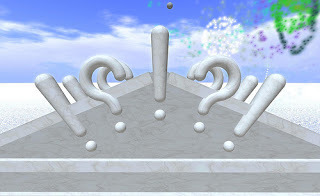 Pattern Five: Complex Sentence (Dependent clause at the beginning of a sentence.)
Pattern Five: Complex Sentence (Dependent clause at the beginning of a sentence.)
Dependent marker Dependent clause[,] Independent clause[.]
A dependent clause is one that could not stand alone. This would be called a sentence fragment by
your English teachers. An example of a dependent clause is:
Because John hit the ball over the fence.
Just reading it, you know that there is something missing. Something should follow or precede it. Otherwise, it doesn't make sense. Dependent clauses are begun with a "dependent marker." The following are some examples.
becausebeforesincewhilealthoughifuntilwhenafterasas if
Additionally, most prepositions like "in, over, on, outside of, beneath, etc." are dependent clause markers.
When the dependent clause comes at the beginning of the sentence, it precedes what it is dependent upon. It depends on the rest of the sentence. In a way its a backwards sentence because we are getting the explanation before we get the thing that needs explaining. As such, the comma comes after the clause. For example:
Because John hit the ball over the fence, the coach made him team captain.
Pattern Six: Complex Sentence (Dependent clause at the end of the sentence.)Independent Clause Dependent Clause Marker Dependent Clause[.]
When the dependent clause (like the ones we mentioned above) appears at the end of a sentence, then it requires no comma. For instance:
The coach made John team captain because he hit the ball over the fence.
Many of us, myself included, treat the word because as if it is a conjunction. It is not. It's a marker for a dependent clause. If you find yourself treating these dependent clause markers as conjunctions in your first draft, here's a quick trick. Use the find function on your word processor. Plug in a word like "because" and search for it. Check each instance to make sure there is no comma in front of it. It sounds laborious, but in reality it will take just a few minutes.
Pattern Seven: Nonessential Dependent Clause or phrase in the middle of a sentence.First part of sentence[,] nonessential dependent clause or phrase[,] second part of sentence[.]
Sometimes a sentence will break in the middle to provide some extra information. Sometimes this is essential to understanding the sentence. Sometimes it is not. Distinguishing between the two is sometimes an art. Two people looking at the same clause may sometimes disagree about it being essential. However, most times it is obvious.
This sentence pattern is for times when the extra information is not really essential to the sentence.
John, who is dating Carol, hit the ball over the fence
John's relationship with Carol is unrelated to his ability to hit the ball.
Pattern Eight: Essential dependent clause or phrase in the middle of a sentence.First part of sentence essential dependent clause or phrase last part of sentence[.]
Sometimes the clause is essential to the understanding of the sentence. This is often in order to set apart a class of the subject. An Example:
Players who are trained to hit a fastball have no trouble knocking John's pitches out of the park.
We are not talking about all players. We are limiting the scope of our discussion to just those who have been trained to hit a fastball. Indeed, this would make little sense if we removed the clause.
There you have them eight sentence patterns. I hope you didn't get too bored going over this. However, if you learn these patterns, a huge percentage of your punctuation editing issues will be solved.
Bonus: Quick Pattern Cheat SheetNow that you understand the basics, print out this cheat sheet to help you when you are editing.
Simple Sentence
Independent clause[.]
John hit the ball.
Compound Sentence (with coordinating conjunction)
Independent Clause[,] Coordinating Conjunction Independent Clause
John hit the ball, and he ran the bases.
Compound Sentence (with no coordinating conjunction)
Independent Clause[;] Independent Clause
John hit the ball; he ran the bases.
Compound Sentence (independent marker)
Independent clause[;] independent marker[,] independent clause[.]
John hit the ball; however, he thought he could have done better.
Complex Sentence (Dependent clause at beginning of sentence)
Dependent marker Dependent clause[,] Independent clause[.]
Because John hit the ball over the fence, the coach made him team captain.
Complex Sentence (independent clause at the end of sentence)
Independent Clause Dependent Clause Marker dependent Clause[.]
The coach made John team captain because he hit the ball over the fence.
Sentence with nonessential dependent clause in middle of sentence
First part of sentence[,] nonessential dependent clause or phrase[,] second part of sentence[.]
John, who was dating Carol, hit the ball over the fence.
Sentence with essential clause in middle of sentence
First part of sentence essential dependent clause or phrase last part of sentence[.]
Players who are trained to hit a fastball have no problem with John's pitches.
 Pattern Five: Complex Sentence (Dependent clause at the beginning of a sentence.)
Pattern Five: Complex Sentence (Dependent clause at the beginning of a sentence.)Dependent marker Dependent clause[,] Independent clause[.]
A dependent clause is one that could not stand alone. This would be called a sentence fragment by
your English teachers. An example of a dependent clause is:
Because John hit the ball over the fence.
Just reading it, you know that there is something missing. Something should follow or precede it. Otherwise, it doesn't make sense. Dependent clauses are begun with a "dependent marker." The following are some examples.
becausebeforesincewhilealthoughifuntilwhenafterasas if
Additionally, most prepositions like "in, over, on, outside of, beneath, etc." are dependent clause markers.
When the dependent clause comes at the beginning of the sentence, it precedes what it is dependent upon. It depends on the rest of the sentence. In a way its a backwards sentence because we are getting the explanation before we get the thing that needs explaining. As such, the comma comes after the clause. For example:
Because John hit the ball over the fence, the coach made him team captain.
Pattern Six: Complex Sentence (Dependent clause at the end of the sentence.)Independent Clause Dependent Clause Marker Dependent Clause[.]
When the dependent clause (like the ones we mentioned above) appears at the end of a sentence, then it requires no comma. For instance:
The coach made John team captain because he hit the ball over the fence.
Many of us, myself included, treat the word because as if it is a conjunction. It is not. It's a marker for a dependent clause. If you find yourself treating these dependent clause markers as conjunctions in your first draft, here's a quick trick. Use the find function on your word processor. Plug in a word like "because" and search for it. Check each instance to make sure there is no comma in front of it. It sounds laborious, but in reality it will take just a few minutes.
Pattern Seven: Nonessential Dependent Clause or phrase in the middle of a sentence.First part of sentence[,] nonessential dependent clause or phrase[,] second part of sentence[.]
Sometimes a sentence will break in the middle to provide some extra information. Sometimes this is essential to understanding the sentence. Sometimes it is not. Distinguishing between the two is sometimes an art. Two people looking at the same clause may sometimes disagree about it being essential. However, most times it is obvious.
This sentence pattern is for times when the extra information is not really essential to the sentence.
John, who is dating Carol, hit the ball over the fence
John's relationship with Carol is unrelated to his ability to hit the ball.
Pattern Eight: Essential dependent clause or phrase in the middle of a sentence.First part of sentence essential dependent clause or phrase last part of sentence[.]
Sometimes the clause is essential to the understanding of the sentence. This is often in order to set apart a class of the subject. An Example:
Players who are trained to hit a fastball have no trouble knocking John's pitches out of the park.
We are not talking about all players. We are limiting the scope of our discussion to just those who have been trained to hit a fastball. Indeed, this would make little sense if we removed the clause.
There you have them eight sentence patterns. I hope you didn't get too bored going over this. However, if you learn these patterns, a huge percentage of your punctuation editing issues will be solved.
Bonus: Quick Pattern Cheat SheetNow that you understand the basics, print out this cheat sheet to help you when you are editing.
Simple Sentence
Independent clause[.]
John hit the ball.
Compound Sentence (with coordinating conjunction)
Independent Clause[,] Coordinating Conjunction Independent Clause
John hit the ball, and he ran the bases.
Compound Sentence (with no coordinating conjunction)
Independent Clause[;] Independent Clause
John hit the ball; he ran the bases.
Compound Sentence (independent marker)
Independent clause[;] independent marker[,] independent clause[.]
John hit the ball; however, he thought he could have done better.
Complex Sentence (Dependent clause at beginning of sentence)
Dependent marker Dependent clause[,] Independent clause[.]
Because John hit the ball over the fence, the coach made him team captain.
Complex Sentence (independent clause at the end of sentence)
Independent Clause Dependent Clause Marker dependent Clause[.]
The coach made John team captain because he hit the ball over the fence.
Sentence with nonessential dependent clause in middle of sentence
First part of sentence[,] nonessential dependent clause or phrase[,] second part of sentence[.]
John, who was dating Carol, hit the ball over the fence.
Sentence with essential clause in middle of sentence
First part of sentence essential dependent clause or phrase last part of sentence[.]
Players who are trained to hit a fastball have no problem with John's pitches.
Published on June 30, 2013 00:02
June 28, 2013
Self-Editing Part V: Eight Sentence Patterns
Okay, back to my fascinating series on self-editing. Stop yawning in the back of the class. We are still looking at those pesky commas, but we are stepping back and getting some sense of context.
Once you understand a bit about what kind of sentence you have, the punctuation and why it is there makes more sense.
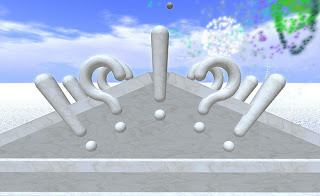 Photo by Torley
Photo by Torley
Just a note. This is not original with me. I did most of my research at The OWL (Online Writing Lab) at Purdue University Website. This is a fabulous resource for all writers, even though the emphasis is on academic writing. Navigation is a bit tricky, but perseverance will pay off. The article related to this subject is found here.
Pattern One: Simple SentenceIndependent clause[.]
A simple sentence has a single subject and verb followed by either a direct object (that which the verb acts upon) or a prepositional phrase. This is also known as an "independent" clause because it can stand alone as a sentence. Sometimes independent clauses can be used as parts of other sentences.
The nice thing about a simple sentence is that, aside from a period, question mark or exclamation point at the end, you don't need any punctuation at all.
Examples:
Simple declarative sentence or one that states something as a fact.
John hit the ball.
Simple declarative sentence with prepositional phrase
John swung at the ball.
Simple declarative sentence with a direct object followed by a prepositional phrase.
John hit the ball over the fence.
Simple question.
Where did John hit the ball?
Pattern Two: Compound Sentence (Coordinating Conjunction)Independent Clause[,] Coordinating Conjunction Independent Clause
Next to the simple sentence, the compound sentence is the easiest to understand. Basically, you take two sentences, each of which could stand alone, and stick them together using one of the following words:
andorbutforornorsoyet
Notice that several words frequently used as conjunctions are not included such as "however" and "therefore." Those are called independent markers and are handled differently. We will talk about them later.
Example:
John hit the ball over the fence, and he listened to the cheers of the crowd.
Pattern Three: Compound Sentence (Semicolon)Independent Clause[;] Independent Clause
This one is not as popular as it used to be, however, it is the cure for the dreaded comma splice. Okay, you are scratching your heads saying, "I remember my English teacher writing that on my paper, and I never did understand it."
It's really rather simple, but, honestly, the explanations have not always been the best.
A comma splice is where you try to put together two sentences using only a comma between them. Think about the word "splice." I come from a radio background. Back in the day we "spliced" together pieces of audio tape. We literally stuck two pieces of a recording together using a fancy version of cellophane tape. Okay, now you know how old I really am. But stay with me a bit. If I only used a piece of tape half as wide, it would not have held.
Think about the comma as the bottom half of the splicing tape. The dot above it as the top half. A dot above a comma is a semicolon. I see the light bulbs going on right now. The comma doesn't have enough grammatical strength to hold together two sentences without the help of a coordinating conjunction, but a semicolon does.
Example:
John hit the ball; it flew over the centerfield fence.
Pattern Four: Compound Sentence (Independent Marker)Independent clause[;] independent marker[,] independent clause[.]
An independent marker is simply a connecting word that introduces a sentence. It can introduce that sentence as a standalone sentence or as part of an independent clause in a compound sentence.
Some common independent markers include:
thereforehowevermoreoverthusconsequentlyalso
Don't think about these words as conjunctions (like "and"). Think about them as the first word of a new sentence. Therefore, if the second clause begins with one of these words, you need a semicolon instead of a comma preceding it. Since these words, used in the middle of a sentence, need commas on both sides, a comma needs to follow it when it appears at the beginning of a sentence.
Example:
John hit the ball over the centerfield fence; however, his steroid use made him ineligible for MVP.
Just a note here. I'm not one to say that "And," "but," or any of the other coordinating conjunctions are not to be used to begin a sentence. Sometimes, they make the most sense. However, when you see one at the beginning of a sentence consider replacing it with an independent marker.
Okay, I can see your eyes starting to glaze over. We'll deal with the other four sentence patterns later this weekend.
Once you understand a bit about what kind of sentence you have, the punctuation and why it is there makes more sense.
 Photo by Torley
Photo by TorleyJust a note. This is not original with me. I did most of my research at The OWL (Online Writing Lab) at Purdue University Website. This is a fabulous resource for all writers, even though the emphasis is on academic writing. Navigation is a bit tricky, but perseverance will pay off. The article related to this subject is found here.
Pattern One: Simple SentenceIndependent clause[.]
A simple sentence has a single subject and verb followed by either a direct object (that which the verb acts upon) or a prepositional phrase. This is also known as an "independent" clause because it can stand alone as a sentence. Sometimes independent clauses can be used as parts of other sentences.
The nice thing about a simple sentence is that, aside from a period, question mark or exclamation point at the end, you don't need any punctuation at all.
Examples:
Simple declarative sentence or one that states something as a fact.
John hit the ball.
Simple declarative sentence with prepositional phrase
John swung at the ball.
Simple declarative sentence with a direct object followed by a prepositional phrase.
John hit the ball over the fence.
Simple question.
Where did John hit the ball?
Pattern Two: Compound Sentence (Coordinating Conjunction)Independent Clause[,] Coordinating Conjunction Independent Clause
Next to the simple sentence, the compound sentence is the easiest to understand. Basically, you take two sentences, each of which could stand alone, and stick them together using one of the following words:
andorbutforornorsoyet
Notice that several words frequently used as conjunctions are not included such as "however" and "therefore." Those are called independent markers and are handled differently. We will talk about them later.
Example:
John hit the ball over the fence, and he listened to the cheers of the crowd.
Pattern Three: Compound Sentence (Semicolon)Independent Clause[;] Independent Clause
This one is not as popular as it used to be, however, it is the cure for the dreaded comma splice. Okay, you are scratching your heads saying, "I remember my English teacher writing that on my paper, and I never did understand it."
It's really rather simple, but, honestly, the explanations have not always been the best.
A comma splice is where you try to put together two sentences using only a comma between them. Think about the word "splice." I come from a radio background. Back in the day we "spliced" together pieces of audio tape. We literally stuck two pieces of a recording together using a fancy version of cellophane tape. Okay, now you know how old I really am. But stay with me a bit. If I only used a piece of tape half as wide, it would not have held.
Think about the comma as the bottom half of the splicing tape. The dot above it as the top half. A dot above a comma is a semicolon. I see the light bulbs going on right now. The comma doesn't have enough grammatical strength to hold together two sentences without the help of a coordinating conjunction, but a semicolon does.
Example:
John hit the ball; it flew over the centerfield fence.
Pattern Four: Compound Sentence (Independent Marker)Independent clause[;] independent marker[,] independent clause[.]
An independent marker is simply a connecting word that introduces a sentence. It can introduce that sentence as a standalone sentence or as part of an independent clause in a compound sentence.
Some common independent markers include:
thereforehowevermoreoverthusconsequentlyalso
Don't think about these words as conjunctions (like "and"). Think about them as the first word of a new sentence. Therefore, if the second clause begins with one of these words, you need a semicolon instead of a comma preceding it. Since these words, used in the middle of a sentence, need commas on both sides, a comma needs to follow it when it appears at the beginning of a sentence.
Example:
John hit the ball over the centerfield fence; however, his steroid use made him ineligible for MVP.
Just a note here. I'm not one to say that "And," "but," or any of the other coordinating conjunctions are not to be used to begin a sentence. Sometimes, they make the most sense. However, when you see one at the beginning of a sentence consider replacing it with an independent marker.
Okay, I can see your eyes starting to glaze over. We'll deal with the other four sentence patterns later this weekend.
Published on June 28, 2013 15:27
June 19, 2013
New Self Publishing Course to be Offered
As you might have noticed in some of my previous posts, I'm a might disturbed by "consultants" and others who are ripping off authors interested in self publishing by charging for services most competent authors can do themselves. Well, I'm going to do more about it than complain. I've decided to offer a course called Ridiculously Simple Self Publishing
This course will teach you everything you need to know to publish your book to Amazon as a Kindle ebook. These techniques are transferable to most other online publishers as well. Although, we'll discuss why you might want to stick to Kindle exclusively at least for awhile.
Some Topics Include:
Format Your Book in a Half Hour or Less
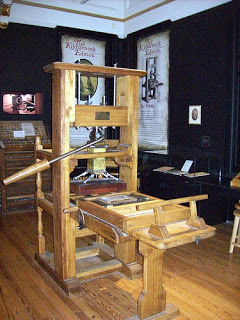 "Freedom of the Press
"Freedom of the Press
Belongs to Those Who Own One"
A.J. Liebling Setting up a Kindle Account
Understanding your Kindle Dashboard
Setting up your author page
Free tools to use to prepare your document
How to create a cover like a pro without using Photoshop
Self-Editing techniques
Doing it all for Free
Setting your price point
Optimizing for the Kindle Search Engine
Basics of Social Media Promotion
... And More
When the course goes live July 15, the registration fee will be $20 (still a lot less than just hiring someone to do one of the things we teach) but for those who want to pre-register before the launch, the price is just $10 .
The course will include 10 video lessons that you can work through at your own pace. I want this to be accessible and affordable for anyone interested in this exciting new field. I've been told that I'm not charging enough, but if I charged much more, I'd be like those other people taking advantage of indie writers.
Click Here to find out more and to register for the course.
This course will teach you everything you need to know to publish your book to Amazon as a Kindle ebook. These techniques are transferable to most other online publishers as well. Although, we'll discuss why you might want to stick to Kindle exclusively at least for awhile.
Some Topics Include:
Format Your Book in a Half Hour or Less
 "Freedom of the Press
"Freedom of the PressBelongs to Those Who Own One"
A.J. Liebling Setting up a Kindle Account
Understanding your Kindle Dashboard
Setting up your author page
Free tools to use to prepare your document
How to create a cover like a pro without using Photoshop
Self-Editing techniques
Doing it all for Free
Setting your price point
Optimizing for the Kindle Search Engine
Basics of Social Media Promotion
... And More
When the course goes live July 15, the registration fee will be $20 (still a lot less than just hiring someone to do one of the things we teach) but for those who want to pre-register before the launch, the price is just $10 .
The course will include 10 video lessons that you can work through at your own pace. I want this to be accessible and affordable for anyone interested in this exciting new field. I've been told that I'm not charging enough, but if I charged much more, I'd be like those other people taking advantage of indie writers.
Click Here to find out more and to register for the course.
Published on June 19, 2013 00:34
June 16, 2013
About Story, Craft, Context and "Bad" Writng
A couple of days ago someone on a writer's email loop lamented that a lot of "bad" writing was very popular. They mentioned several examples. I responded with this. Someone suggested I post this to my blog. So, here it is.
Actually, "bad" writing, all too often, is considered "bad" simply because we don't like it. The problem with that approach is that it ignores the fact that other people do. For them it's "good" writing.
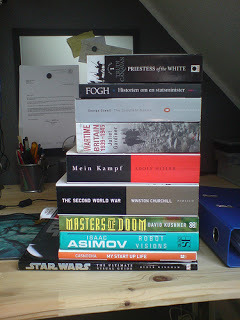 "Quality" itself (as academics, critics and esthetes define it) is not enough for a novel to be compelling enough to be popular. "Craft" is not enough either. Being able to find the exact right word or following all the "rules" about avoiding passive voice, wordiness and adverbs. So, then, what does make a novel compelling enough for a significant number of people to read it?
"Quality" itself (as academics, critics and esthetes define it) is not enough for a novel to be compelling enough to be popular. "Craft" is not enough either. Being able to find the exact right word or following all the "rules" about avoiding passive voice, wordiness and adverbs. So, then, what does make a novel compelling enough for a significant number of people to read it? It begins with a story
First, writing tells a story. If the story is compelling, and, if we can care about the characters, we will forgive the occasional foul up. Look, we forgive Shakespeare for having a clock in ancient Rome or aging Hamlet something like 10 years in a couple of days. Why? Because the story is so incredibly good. Dickens' long expositions and coincidences would be panned
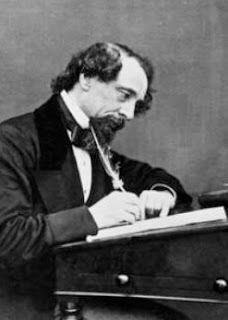 mercilessly in most modern critique groups, but those characters like Fagan, Scrooge, Pickwick, Fezziwig and Little Nell keep us reading.
mercilessly in most modern critique groups, but those characters like Fagan, Scrooge, Pickwick, Fezziwig and Little Nell keep us reading. A story is not simply the sum of its parts. Indeed, it is not even just the creation of the author. A reading experience exists at the intersection of the author, the text, the reader and the social context. In that sense, there is not one story but six billion possible stories.
The Importance of Context
The same story, read by the same person separated by a number of years can produce a entirely different experience. It's not fiction, but the example that comes to mind is Robert Frost's famous poem about the "Road not Taken." That last haunting stanza:
I shall be telling this with a sighSomewhere ages and ages henceTwo roads diverged within a wood and I
 I took the one less traveled byAnd that has made all the difference.
I took the one less traveled byAnd that has made all the difference. I first met that poem in high school where many roads with many intersections were before me. At that time, it was a cautionary tale, something to consider as I made the choices in front of me.
In other words, I lived that poem in the first stanza. Now, 50 years later, most of those roads are behind me. I have "trodden black" most of the leaves on those roads, and taken my fair share of those "less traveled by," and I am living in the last stanza. My experience of that poem is not anticipatory, but nostalgic. It is a different poem for me now than it was then.
The same can be said of Poe, Asimov, Wells, Verne, Clark, Simak, Tolkein and all the other literary loves of my youth. Even some of the books I, now, look at and wonder how they ever got published were precious to me then. The craft may not have been there, but the story was and it took me somewhere other than the dismal place I lived.
I may not like or even approve morally of something like Dan Brown's conspiracy theory based books or the explicit 50 Shades of Gray, but they do speak to something within a person that evokes a sense of wonder and adventure. Once we replace story with "craft" we lose our audience. Ideally, we should have both, but story must always come first. And if the story does not take us out of the ordinary, it will never sell.
Published on June 16, 2013 20:18
June 13, 2013
Professional, Activist or Hobbyist
Recently, I've been discussing various issues related to indie publishing. I've been thinking about them because I am preparing a course called Ridiculously Simple Self Publishing. I hurt someone's feelings I think when they made the comment that they intended to pursue indie publishing "professionally" by outsourcing everything except the writing (which they nearly outsourced by having content editors and book doctors help rewrite). However, they added, that they spent a lot of money, and would not recoup their expenses, but they were proud of the professional job done.
Sorry, folks. It may be a quality job (or not). It may be a polished job. However, a professional job produces a profit. If you are not showing a profit, you are not pursuing a business, you are pursuing a hobby.
There is nothing wrong with doing something for the sheer enjoyment. Nor does it imply a low quality item just because it's produced as the result of someone pursuing a hobby. It doesn't mean someone isn't serious about what they are doing. My mother crocheted afghans that will outlast anything I've bought in stores. She was very concerned about the quality of the materials and the work. However, she never sold any of her work. If she had, she probably would not have been able to get a price that would have adequately compensated for the time and materials she had in the product. She was a hobbyist. A very skilled, very serious person who did a craft for the joy of the craft itself.
Many writers are like that when they decide to go into indie publishing. I say, God Bless them. If they can afford to take a loss in order to turn out some piece of art, that's great. However, they should not deceive themselves or others that they are more "professional" than those of us who watch our costs and produce a product that first the reader can afford and second will turn a profit.
To be professional means you make money on what you do. It doesn't necessarily mean your product is better. Indeed, it might not be as polished. A handmade cabinet done by your grandfather in his shop that took two years to complete, is probably much nicer than one produced by a furniture company. However, his costs would make it a product only a few could afford to buy and unless he lived in a high income area, he would probably not show a profit if he did that type of work all the time.
I know it sounds very noble to talk like we are artistes above the concerns of commerce, but, whether we like to admit it or not, books, even ebooks, are products. If you are an indie publisher, you are a manufacturer of books.
If you are only interested in writing for the sheer joy of it and can afford to outsource all the various parts of your project, more power to you. If you are an activist with a cause to pursue or a message to get across, likewise I wish you well. However, I do have a problem when those who are doing this at a loss advise others who may be pursuing a profession as an indie writer/publisher to do the same. That's bad business advice.
I have been writing a series (and I will return to it this weekend) about self-editing. Why? Because this is one area where an indie publisher can save some money. Even if you do eventually outsource the final proofreading, it reduce the work your editor has to do and, thus, save you money.
If you, like my friend, prefer to "just write" and are willing to take a loss, that's great. I honor that. I just ask that you not make those of us pursuing this as a business to try and do things your way.
Sorry, folks. It may be a quality job (or not). It may be a polished job. However, a professional job produces a profit. If you are not showing a profit, you are not pursuing a business, you are pursuing a hobby.
There is nothing wrong with doing something for the sheer enjoyment. Nor does it imply a low quality item just because it's produced as the result of someone pursuing a hobby. It doesn't mean someone isn't serious about what they are doing. My mother crocheted afghans that will outlast anything I've bought in stores. She was very concerned about the quality of the materials and the work. However, she never sold any of her work. If she had, she probably would not have been able to get a price that would have adequately compensated for the time and materials she had in the product. She was a hobbyist. A very skilled, very serious person who did a craft for the joy of the craft itself.
Many writers are like that when they decide to go into indie publishing. I say, God Bless them. If they can afford to take a loss in order to turn out some piece of art, that's great. However, they should not deceive themselves or others that they are more "professional" than those of us who watch our costs and produce a product that first the reader can afford and second will turn a profit.
To be professional means you make money on what you do. It doesn't necessarily mean your product is better. Indeed, it might not be as polished. A handmade cabinet done by your grandfather in his shop that took two years to complete, is probably much nicer than one produced by a furniture company. However, his costs would make it a product only a few could afford to buy and unless he lived in a high income area, he would probably not show a profit if he did that type of work all the time.
I know it sounds very noble to talk like we are artistes above the concerns of commerce, but, whether we like to admit it or not, books, even ebooks, are products. If you are an indie publisher, you are a manufacturer of books.
If you are only interested in writing for the sheer joy of it and can afford to outsource all the various parts of your project, more power to you. If you are an activist with a cause to pursue or a message to get across, likewise I wish you well. However, I do have a problem when those who are doing this at a loss advise others who may be pursuing a profession as an indie writer/publisher to do the same. That's bad business advice.
I have been writing a series (and I will return to it this weekend) about self-editing. Why? Because this is one area where an indie publisher can save some money. Even if you do eventually outsource the final proofreading, it reduce the work your editor has to do and, thus, save you money.
If you, like my friend, prefer to "just write" and are willing to take a loss, that's great. I honor that. I just ask that you not make those of us pursuing this as a business to try and do things your way.
Published on June 13, 2013 20:46
June 9, 2013
Of scribes, scriveners, printers, publishers and self-publishing consultants
One of my own passions is history. I'm particularly fascinated by ancient history and the development of writing. Up until very recent times, being able to read and write gave a person a good deal of power. The scribes of ancient Egypt were the most powerful class outside of the royal family. In some ways they even wielded power over the pharaoh since, if he wanted something written, he needed to call a scribe. During the First Century, literacy was a bit more wide spread, but even in
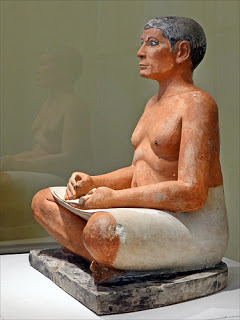 Photo credit dalberathose better times, in Israel, the scribes, the ones who wrote down the Torah and also did things like contracts and letters carried a great deal of influence. So much so, that Jesus was often faced with opposition by the "scribes and pharisees" since he was challenging their claim of exclusivity on the interpretation of the Law.
Photo credit dalberathose better times, in Israel, the scribes, the ones who wrote down the Torah and also did things like contracts and letters carried a great deal of influence. So much so, that Jesus was often faced with opposition by the "scribes and pharisees" since he was challenging their claim of exclusivity on the interpretation of the Law.
During the middle ages, scriveners in the monasteries preserved the literature of earlier days as well as the writings of the times, but they also controlled the access to literature, and many works of antiquity were lost because they were deemed heretical.
A.J. Leibling observed that "Freedom of the press is only guaranteed to those who own one." Well, today, anyone with a computer owns a press. However, every time the availability of publishing written work became more widespread, society was disrupted. It happened with the printing press. It is happening again with the internet.
For many there is a vested interest in restricting access to the means of fully participating in what Milton called "the free marketplace of ideas." This is not because of some nefarious conspiracy. No, it is quite simpler than that. They are losing their sense of being "special." Therefore, while acknowledging or even embracing indie publishing, they continue to try to make it seem mysterious, complex, expensive and something you certainly cannot do on your own.
Of course, many of these voices for "quality" products also have a financial interest. Frequently, people will send me links to blog articles about how you need to hire all sorts of specialists to create your book. Editors, cover designers, formatters, publicists and the list goes on. Then they list costs ranging from several hundred dollars to thousands of dollars. And I always notice - surprise, surprise - they offer those services or sell space on their blogs to people who do.
And the mantra they keep chanting is "Quality Sells." Okay, let's butcher that sacred cow once and for all. A McDonalds sits next to a high end steakhouse. Guess which one has more customers and makes more money every year.
Now, does anyone seriously think McD's sells millions of burgers a day because they are of a higher quality than that served in the high priced steakhouse? Of course not. They sell something that is tasty, filling, forgettable and cheap. People go to the steakhouse on special occassions if at all. People go to McDonalds on a regular basis. Now, is anyone going to brag about having dinner at McD's? Not likely. But they are very likely going to spend more money every year under the Golden Arches than at the steakhouse.
Now, the home of the Big Mac could produce a higher quality product. They could grind their own hamburger from top sirloin steak, hire chefs from leading culinary schools to staff their restaurants, cook each burger to order perfectly and slowly and serve them on fine china. However, you would not get a McChicken Deluxe for $1.79.
If you need a top quality product to be successful, why is it, that, the most successful brands are those that make things that just work, but are probably not top of the line. Indeed, the closer you get to the top of the line, the fewer buyers you have.
Does this mean, you don't spend any time on your book? Of course, not. However, spend the time where it counts - writing the book. If you want to spend money, take some good quality classes in story construction, characterization, and basic writing.
Go back to McDonalds. They don't spend a lot of money on high priced stuff, but they spend millions on research into what people like to eat. They produce something that appeals to that taste. It might not be the best for you, but it is something people (not everyone, but a large number of people) want to eat. They also know that people want something they can afford and get in a hurry. In other words, they spend time and money on the content more than the packaging.
Their "quality" is in giving people what they want at a price they can afford. However, these consultants and gurus want self-publishers to spend thousands on things that, the average reader would not even notice, or if they do, it doesn't impact them enough to not buy the book if the price is right.
The problem with this is that every dollar you spend on production has to be made up somewhere. That means raising the price. Indie publishers have an edge over traditional publishers because we can work with low overhead. They can't. However, many are squandering that advantage by buying top sirloin and hiring cordon bleu chefs. Is someone going to be willing to spend the same amount of money on one of my books, if I'm unknown to them, as, say, Stephen King? Probably not. However, if my book is half the price of a novel by Stephen King, say about the price of a loaf of bread instead of that of a meal at a fast-food restaurant (I must be hungry), then they may be willing to take a chance on me. And if they have read my books and like them, they might download several books instead of just one.
In other words, like McDonalds, by controlling my expenses I not only keep a good profit margin, but I can also offer more value to my reader. Is my novel that I edited myself absolutely error free? Probably not. Neither would it be if I had it edited professionally. I might catch 98 percent of the errors. The pro might catch 99. If the story is good, and the number of errors are low, then the reader will come back for more.
I can make a good cover by spending 20 bucks or so at a stockphoto site finding a single image that conveys the idea of the story and add some text to it using a program like GIMP, which can be downloaded for free. Going to a professional cover artist might get me a cover that is a little bit better, but will it be enough better to justify the cost. Always think in these terms: "Will this cover/editing/formatting/etc. produce more sales than if I did it myself? If so, will it produce enough extra sales to cover the cost and show a profit.
If you spend $100 for cover design, $500 for editing, $200 for someone to format and upload your book (all of which you can probably do if you are willing to work) and you are selling your book at $2.99 on Kindle select, you will need to sell close to 400 units before you even see a profit. Do you honestly believe that spending that amount of money will produce 400 sales you would not have had otherwise? From a marketing perspective, that 800 dollars would be better spent on advertising.
So, lets lay this myth to rest right now. Quality, in the sense of spending a lot of money producing a slightly more polished product, does not sell, unless you can achieve it economically enough to give the buyer a good deal. The better the product does not necessarily mean the greater the sales.
If indie publishing is mostly a hobby or a way to publish, and you are not concerned about making money, then spend thousands and either take the loss or deal with having fewer readers who will likely not even notice all the great editing or cover designs.
On the other hand, if you consider this a business, you are more likely to show a profit in a shorter period of time if you only outsource those things you know you will mess up big time. Otherwise, do as much as possible yourself. That is one of the reasons I'm giving you a series of lessons on self-editing which I will continue next week.
 Photo credit dalberathose better times, in Israel, the scribes, the ones who wrote down the Torah and also did things like contracts and letters carried a great deal of influence. So much so, that Jesus was often faced with opposition by the "scribes and pharisees" since he was challenging their claim of exclusivity on the interpretation of the Law.
Photo credit dalberathose better times, in Israel, the scribes, the ones who wrote down the Torah and also did things like contracts and letters carried a great deal of influence. So much so, that Jesus was often faced with opposition by the "scribes and pharisees" since he was challenging their claim of exclusivity on the interpretation of the Law.During the middle ages, scriveners in the monasteries preserved the literature of earlier days as well as the writings of the times, but they also controlled the access to literature, and many works of antiquity were lost because they were deemed heretical.
A.J. Leibling observed that "Freedom of the press is only guaranteed to those who own one." Well, today, anyone with a computer owns a press. However, every time the availability of publishing written work became more widespread, society was disrupted. It happened with the printing press. It is happening again with the internet.
For many there is a vested interest in restricting access to the means of fully participating in what Milton called "the free marketplace of ideas." This is not because of some nefarious conspiracy. No, it is quite simpler than that. They are losing their sense of being "special." Therefore, while acknowledging or even embracing indie publishing, they continue to try to make it seem mysterious, complex, expensive and something you certainly cannot do on your own.
Of course, many of these voices for "quality" products also have a financial interest. Frequently, people will send me links to blog articles about how you need to hire all sorts of specialists to create your book. Editors, cover designers, formatters, publicists and the list goes on. Then they list costs ranging from several hundred dollars to thousands of dollars. And I always notice - surprise, surprise - they offer those services or sell space on their blogs to people who do.
And the mantra they keep chanting is "Quality Sells." Okay, let's butcher that sacred cow once and for all. A McDonalds sits next to a high end steakhouse. Guess which one has more customers and makes more money every year.
Now, does anyone seriously think McD's sells millions of burgers a day because they are of a higher quality than that served in the high priced steakhouse? Of course not. They sell something that is tasty, filling, forgettable and cheap. People go to the steakhouse on special occassions if at all. People go to McDonalds on a regular basis. Now, is anyone going to brag about having dinner at McD's? Not likely. But they are very likely going to spend more money every year under the Golden Arches than at the steakhouse.
Now, the home of the Big Mac could produce a higher quality product. They could grind their own hamburger from top sirloin steak, hire chefs from leading culinary schools to staff their restaurants, cook each burger to order perfectly and slowly and serve them on fine china. However, you would not get a McChicken Deluxe for $1.79.
If you need a top quality product to be successful, why is it, that, the most successful brands are those that make things that just work, but are probably not top of the line. Indeed, the closer you get to the top of the line, the fewer buyers you have.
Does this mean, you don't spend any time on your book? Of course, not. However, spend the time where it counts - writing the book. If you want to spend money, take some good quality classes in story construction, characterization, and basic writing.
Go back to McDonalds. They don't spend a lot of money on high priced stuff, but they spend millions on research into what people like to eat. They produce something that appeals to that taste. It might not be the best for you, but it is something people (not everyone, but a large number of people) want to eat. They also know that people want something they can afford and get in a hurry. In other words, they spend time and money on the content more than the packaging.
Their "quality" is in giving people what they want at a price they can afford. However, these consultants and gurus want self-publishers to spend thousands on things that, the average reader would not even notice, or if they do, it doesn't impact them enough to not buy the book if the price is right.
The problem with this is that every dollar you spend on production has to be made up somewhere. That means raising the price. Indie publishers have an edge over traditional publishers because we can work with low overhead. They can't. However, many are squandering that advantage by buying top sirloin and hiring cordon bleu chefs. Is someone going to be willing to spend the same amount of money on one of my books, if I'm unknown to them, as, say, Stephen King? Probably not. However, if my book is half the price of a novel by Stephen King, say about the price of a loaf of bread instead of that of a meal at a fast-food restaurant (I must be hungry), then they may be willing to take a chance on me. And if they have read my books and like them, they might download several books instead of just one.
In other words, like McDonalds, by controlling my expenses I not only keep a good profit margin, but I can also offer more value to my reader. Is my novel that I edited myself absolutely error free? Probably not. Neither would it be if I had it edited professionally. I might catch 98 percent of the errors. The pro might catch 99. If the story is good, and the number of errors are low, then the reader will come back for more.
I can make a good cover by spending 20 bucks or so at a stockphoto site finding a single image that conveys the idea of the story and add some text to it using a program like GIMP, which can be downloaded for free. Going to a professional cover artist might get me a cover that is a little bit better, but will it be enough better to justify the cost. Always think in these terms: "Will this cover/editing/formatting/etc. produce more sales than if I did it myself? If so, will it produce enough extra sales to cover the cost and show a profit.
If you spend $100 for cover design, $500 for editing, $200 for someone to format and upload your book (all of which you can probably do if you are willing to work) and you are selling your book at $2.99 on Kindle select, you will need to sell close to 400 units before you even see a profit. Do you honestly believe that spending that amount of money will produce 400 sales you would not have had otherwise? From a marketing perspective, that 800 dollars would be better spent on advertising.
So, lets lay this myth to rest right now. Quality, in the sense of spending a lot of money producing a slightly more polished product, does not sell, unless you can achieve it economically enough to give the buyer a good deal. The better the product does not necessarily mean the greater the sales.
If indie publishing is mostly a hobby or a way to publish, and you are not concerned about making money, then spend thousands and either take the loss or deal with having fewer readers who will likely not even notice all the great editing or cover designs.
On the other hand, if you consider this a business, you are more likely to show a profit in a shorter period of time if you only outsource those things you know you will mess up big time. Otherwise, do as much as possible yourself. That is one of the reasons I'm giving you a series of lessons on self-editing which I will continue next week.
Published on June 09, 2013 06:09
June 6, 2013
Self-Editing Like a Pro Part 4: Those Pesky Commas
Nothing drives a writer-editor nuts faster than what to do about commas. Just recently, I read an article which found that we use fewer commas today than they did in the 1900s. The article also pointed out that commas are less frequently used in advertising copy than in academic writing. It even implied that, if you punctuated a sentence in a news story the same way you would in a scholarly
 journal, you would be acting inappropriately.
journal, you would be acting inappropriately.
I guess the point is that even something, seemingly, as fixed as where to put commas is in flux today. However, that doesn't mean you can ignore them. The classic example is the difference between these two statements:
It changes your tale from a sweet, family memoir to a horror story. All for the loss of a comma.
The Sound Approach to CommasNo, I'm not talking about the classic Victor Borge comedy routine with his verbal punctuation. It's super funny, but doesn't help us much here.
In this context, we are talking about using the sound of the sentence to decide on comma placement. Here's the rule of thumb: If, when reading a sentence, you pause in the middle of it, consider adding a comma.
In fact, let's look at that rule of thumb as an example. It is a conditional sentence. It sets up a condition at the start and ends with the action to be taken. Right after the "If," we have another conditional clause. Finally, we have the action. If you read this sentence out loud like you would speak it, you find that your voice pauses before and after "when reading a sentence" and right before "consider adding a comma."
This, of course, is not perfect. There are situations where such pauses do not indicate commas. Semi-colons and colons are a good example. Also, depending on your own idiosyncratic diction, you may not pause as much as others do.
However, try it and see. When reading a passage out loud, if you find yourself pausing, and there is no comma there, ask yourself if there should be one.
Trigger WordsCertain words appearing at the beginning of a sentence are almost certainly going to either be followed by a comma or the phrase or clause they represent will be.
For instance, words with a time frame reference like After, before, during, or later are good examples. Consider the following sentences:
Words that imply some sort of condition that needs to be met usually lead to a comma immediately following the condition. For instance:
Also, introductory words or phrases are followed by commas. These include
Well
Obviously
Actually
Honestly
Hopefully
Accordingly
However
Therefore
Moreover
Of course
For instance
Presently
Currently
Also ordinal numbers like first, second, third are followed by commas.
Compound SentencesOkay, that's one of those English teacher topics that make you start to fall asleep in class. Well, wake up! It's not very difficult to understand. When you take two sentences and put them together using a word like "and," "or," "but," "however" or "therefore," you have a compound sentence.
If each part of the sentence before or after the conjunction (that's what a word like "and," "or," "but" or "however" is called) could stand alone, then you put a comma before the conjunction.
Every time you come across a sentence with an "and" between two sentences add a comma.
Confusion issue
Sometimes we confuse this type of sentence with a sentence that simply has two verbs connected by a conjunction. For example:
John stabbed the vampire through the heart, and he screamed, "Die, Monster, Die!"
That is a compound sentence requiring the comma. However, if you cut out the subject of the second sentence (the word "he") you would not have the comma. Example:
John stabbed the vampire through the heart and screamed, "Die, Monster, Die."
Well, that's enough for today. I'll continue this discussion in our next post.
 journal, you would be acting inappropriately.
journal, you would be acting inappropriately. I guess the point is that even something, seemingly, as fixed as where to put commas is in flux today. However, that doesn't mean you can ignore them. The classic example is the difference between these two statements:
Let's eat, GrandmaOne is calling Grandma to dinner. The other is just calling Grandma dinner.
Let's eat Grandma
It changes your tale from a sweet, family memoir to a horror story. All for the loss of a comma.
The Sound Approach to CommasNo, I'm not talking about the classic Victor Borge comedy routine with his verbal punctuation. It's super funny, but doesn't help us much here.
In this context, we are talking about using the sound of the sentence to decide on comma placement. Here's the rule of thumb: If, when reading a sentence, you pause in the middle of it, consider adding a comma.
In fact, let's look at that rule of thumb as an example. It is a conditional sentence. It sets up a condition at the start and ends with the action to be taken. Right after the "If," we have another conditional clause. Finally, we have the action. If you read this sentence out loud like you would speak it, you find that your voice pauses before and after "when reading a sentence" and right before "consider adding a comma."
This, of course, is not perfect. There are situations where such pauses do not indicate commas. Semi-colons and colons are a good example. Also, depending on your own idiosyncratic diction, you may not pause as much as others do.
However, try it and see. When reading a passage out loud, if you find yourself pausing, and there is no comma there, ask yourself if there should be one.
Trigger WordsCertain words appearing at the beginning of a sentence are almost certainly going to either be followed by a comma or the phrase or clause they represent will be.
For instance, words with a time frame reference like After, before, during, or later are good examples. Consider the following sentences:
After church, drop by the house.
During the game, Bob went to his room.
Later, I visited my mother
Words that imply some sort of condition that needs to be met usually lead to a comma immediately following the condition. For instance:
If I get out of work early, I'll take you to the play.
When the clock strikes twelve, the figures come out and dance.
Where you see soggy soil, there is usually a leaky pipe underground.
Also, introductory words or phrases are followed by commas. These include
Well
Obviously
Actually
Honestly
Hopefully
Accordingly
However
Therefore
Moreover
Of course
For instance
Presently
Currently
Also ordinal numbers like first, second, third are followed by commas.
Compound SentencesOkay, that's one of those English teacher topics that make you start to fall asleep in class. Well, wake up! It's not very difficult to understand. When you take two sentences and put them together using a word like "and," "or," "but," "however" or "therefore," you have a compound sentence.
If each part of the sentence before or after the conjunction (that's what a word like "and," "or," "but" or "however" is called) could stand alone, then you put a comma before the conjunction.
Every time you come across a sentence with an "and" between two sentences add a comma.
Confusion issue
Sometimes we confuse this type of sentence with a sentence that simply has two verbs connected by a conjunction. For example:
John stabbed the vampire through the heart, and he screamed, "Die, Monster, Die!"
That is a compound sentence requiring the comma. However, if you cut out the subject of the second sentence (the word "he") you would not have the comma. Example:
John stabbed the vampire through the heart and screamed, "Die, Monster, Die."
Well, that's enough for today. I'll continue this discussion in our next post.
Published on June 06, 2013 13:23
Terri Lynn Main's Blog
- Terri Lynn Main's profile
- 7 followers
Terri Lynn Main isn't a Goodreads Author
(yet),
but they
do have a blog,
so here are some recent posts imported from
their feed.


